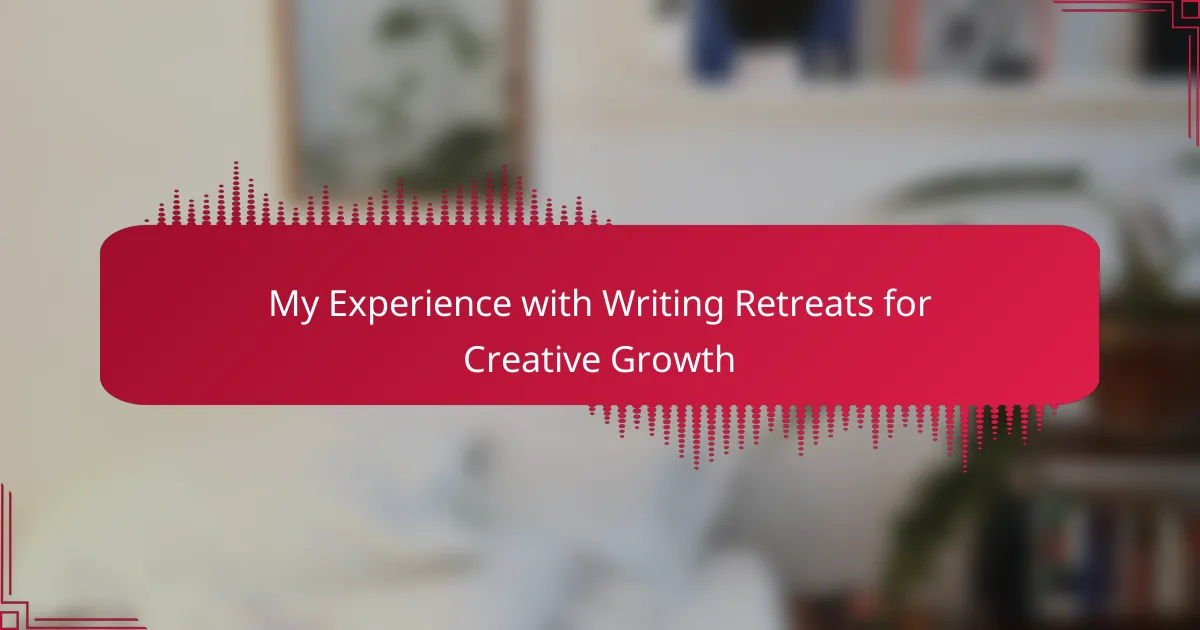Key takeaways
- Writing retreats foster valuable connections with fellow writers, enhancing collaboration and providing new perspectives.
- The focused environment of retreats eliminates distractions, allowing for deeper exploration of creative work.
- Self-reflection and journaling during retreats help clarify goals and reignite passion for storytelling.
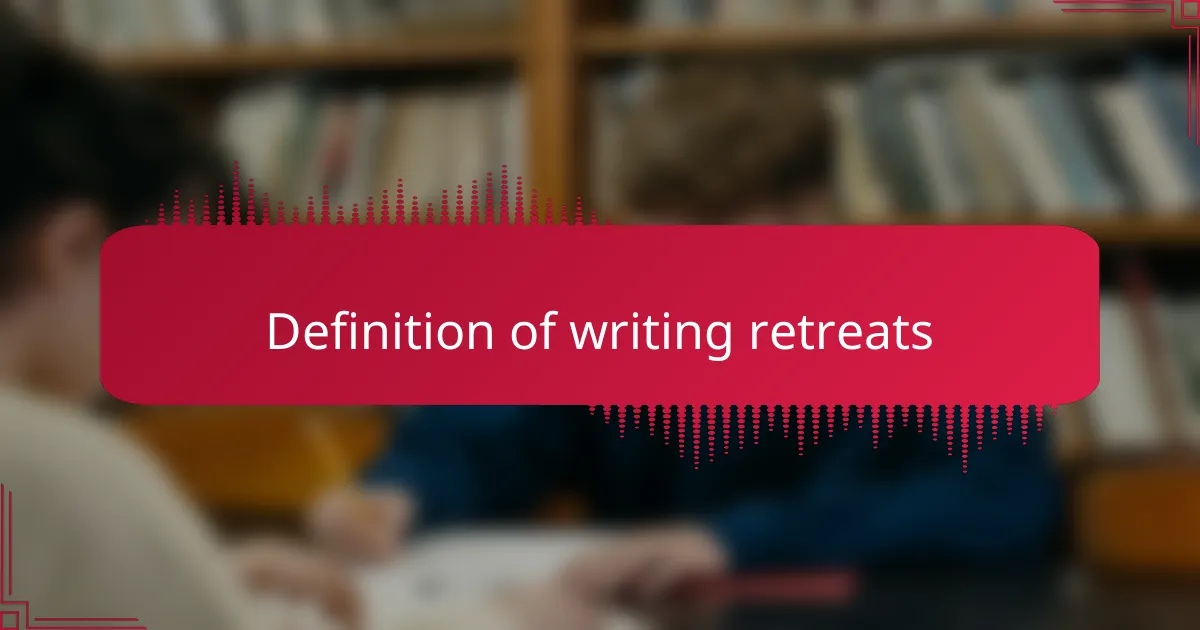
Definition of writing retreats
Writing retreats are immersive experiences where writers can escape their daily routines to focus on their craft. From my perspective, these retreats create a nurturing environment for creativity, offering time away from distractions and the chance to connect deeply with one’s writing. I remember my first retreat; it was at a cozy lodge nestled in the woods, where the serene surroundings sparked inspiration and renewed my passion for storytelling.
These retreats can vary in structure, duration, and location, catering to a wide range of writers. Here’s a brief overview of what they typically involve:
- Extended time: Ranging from a weekend to several weeks
- Focused activities: Workshops, writing sessions, and feedback opportunities
- Community: Networking with fellow writers and sharing experiences
- Guidance: Often led by experienced writers or facilitators
- Inspiration: Surrounded by nature, art, or like-minded individuals to spark creativity
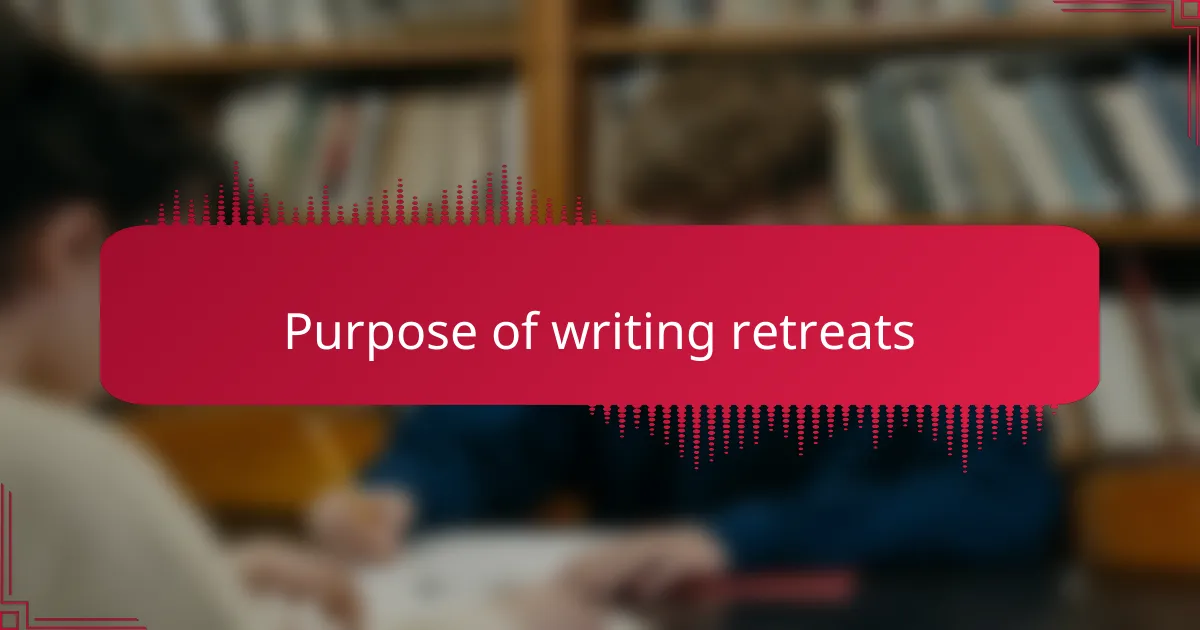
Purpose of writing retreats
Writing retreats serve as a sanctuary where we can reconnect with our creative selves. I often find that stepping away from our everyday chaos allows us to clear our minds and focus solely on our writing. Have you ever felt stuck in a creative rut? I know I have, and I’ve discovered that an uninterrupted stretch at a retreat often provides the breakthrough I need.
The structure of these retreats is purposeful. Workshops and writing sessions offer valuable learning experiences and constructive feedback that can refine our craft. At my last retreat, sharing my work with others felt daunting, yet their insights reminded me how collaboration enhances our storytelling.
Additionally, the community aspect is invaluable. Meeting writers who share the same struggles and ambitions fosters a sense of belonging. I’ve forged lasting friendships during these retreats, where casual conversations about plot ideas turned into brainstorming sessions that led to new projects. The camaraderie and support we build together nurture not just our writing but also our spirits.
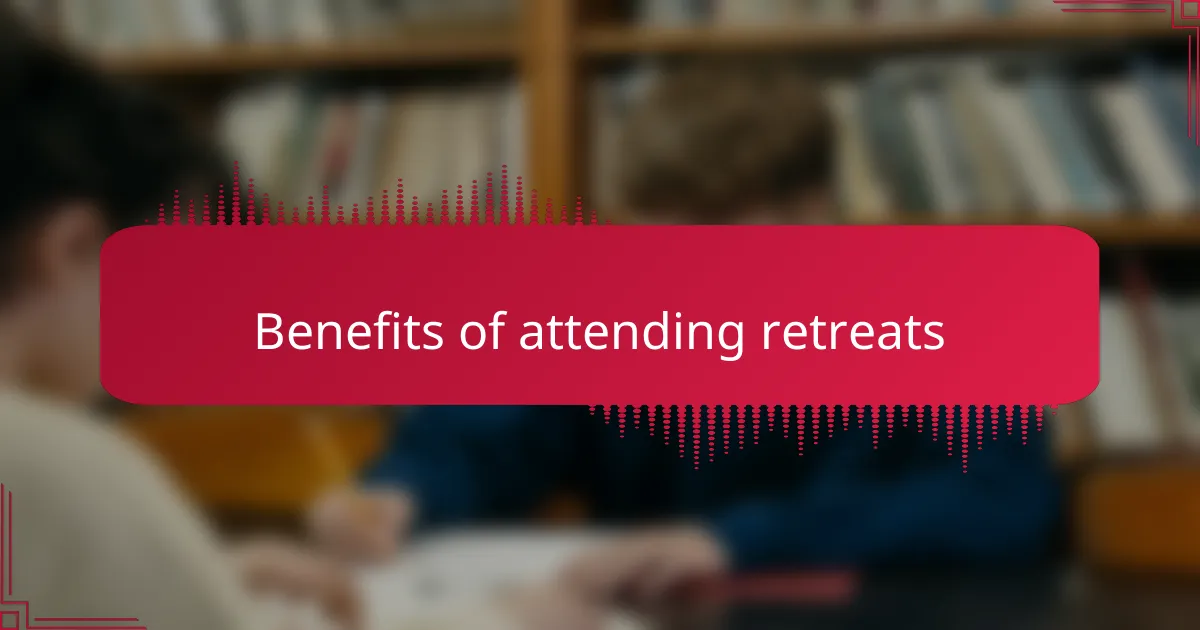
Benefits of attending retreats
Attending writing retreats has been a transformative experience for me, offering a unique space to nurture creativity and foster connections with fellow writers. I vividly remember the first retreat I attended; it was here that I not only honed my craft but also found a supportive community that encouraged me to step outside my comfort zone and explore new storytelling techniques.
The benefits of attending retreats extend far beyond just the writing process. They create an environment conducive to inspiration and collaboration, allowing writers to share their experiences and insights. This communal aspect has motivated me to push through my creative blocks and has led to breakthroughs I hadn’t anticipated.
-
Focused Environment: Retreats provide a dedicated space free from everyday distractions, allowing for deeper concentration on writing.
-
Networking Opportunities: Meeting other writers and industry professionals can lead to valuable connections and collaborations.
-
Fresh Perspectives: Being in a new setting inspires creative thinking, and you’re likely to observe ideas you wouldn’t have explored otherwise.
-
Feedback and Support: Engaging in group critiques helps refine your work and encourages personal growth from diverse viewpoints.
-
Structured Schedule: Many retreats offer a balanced agenda of writing, workshops, and relaxation, keeping you motivated throughout the event.
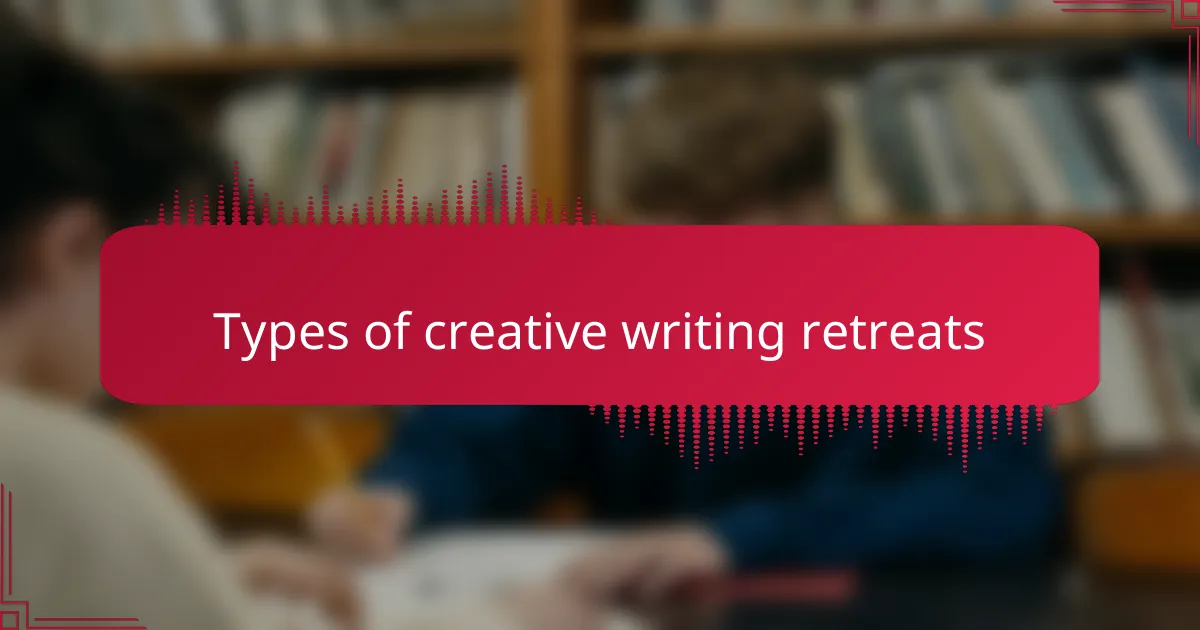
Types of creative writing retreats
When I think about the various types of creative writing retreats, I often reflect on how they cater to different needs and styles. Some retreats focus on specific genres, like fiction or poetry, while others emphasize the overall process of storytelling. I once attended a weekend retreat dedicated to graphic storytelling, and it was a transformative experience that ignited my passion for blending visuals and narrative.
Here are some common types of creative writing retreats you might encounter:
- Genre-Specific Retreats: Tailored for specific writing styles, such as poetry, fiction, or comic scripts.
- Location-Based Retreats: Set in inspiring environments, like mountains or coastal areas, to enhance creativity.
- Personal Development Retreats: Focused on building confidence, breaking writer’s block, or cultivating creative habits.
- Collaborative Retreats: Encourage group projects and peer feedback, fostering a sense of community among writers.
- Intensive Workshops: Usually more structured, offering in-depth critiques and expert guidance on specific writing skills.
Each type of retreat offers its own unique benefits, and I’ve found that choosing the right one can truly elevate your writing journey.
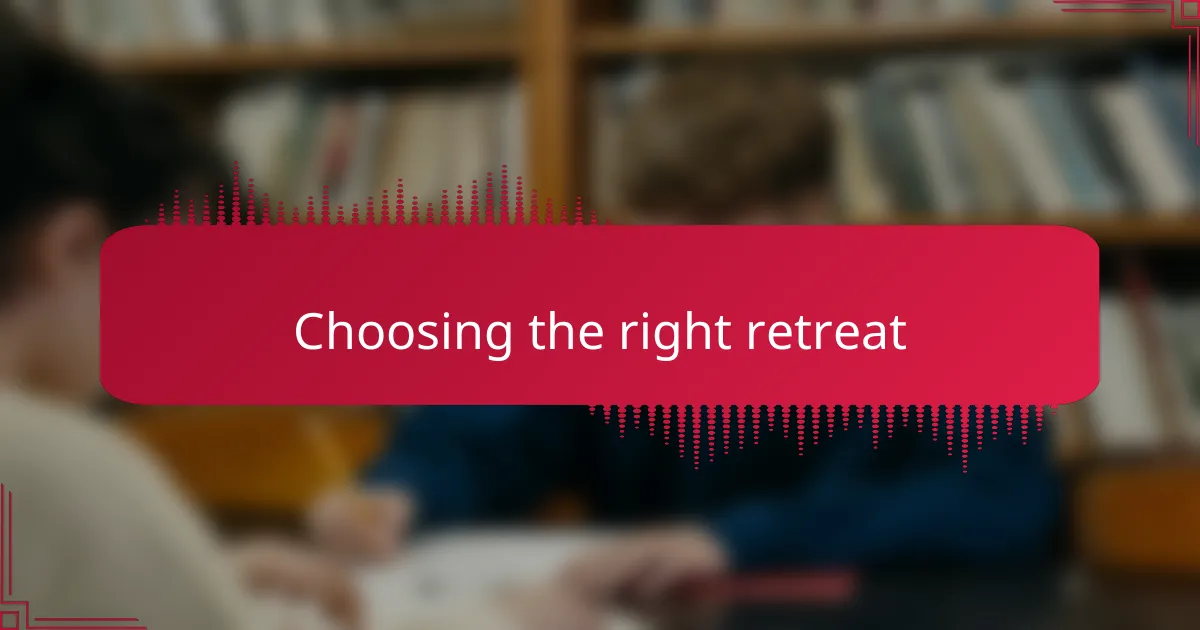
Choosing the right retreat
Choosing the right writing retreat can feel overwhelming with so many options out there. I remember standing in front of my computer, unsure which retreat would truly nurture my creativity. It’s essential to identify what you want to achieve—are you looking to polish a specific project or simply seeking to recharge your inspiration? By clarifying your goals, you can narrow down your choices and focus on what truly resonates with you.
Consider the environment, too. I once attended a retreat in a bustling city, which, while vibrant, often distracted me from my writing. What kind of atmosphere do you thrive in? Some writers flourish in tranquil settings surrounded by nature, while others might prefer the stimulation of an urban landscape. Reflecting on your own preferences can be a guiding factor in making the right choice.
Don’t forget to research the facilitators and their background. I’ve found that the success of a retreat often hinges on the experience and teaching style of the leaders. Look for someone whose work inspires you and whose approach aligns with your writing aspirations. Connecting with the right mentor can make all the difference, and it’s worth taking the time to find the perfect fit for your creative journey.
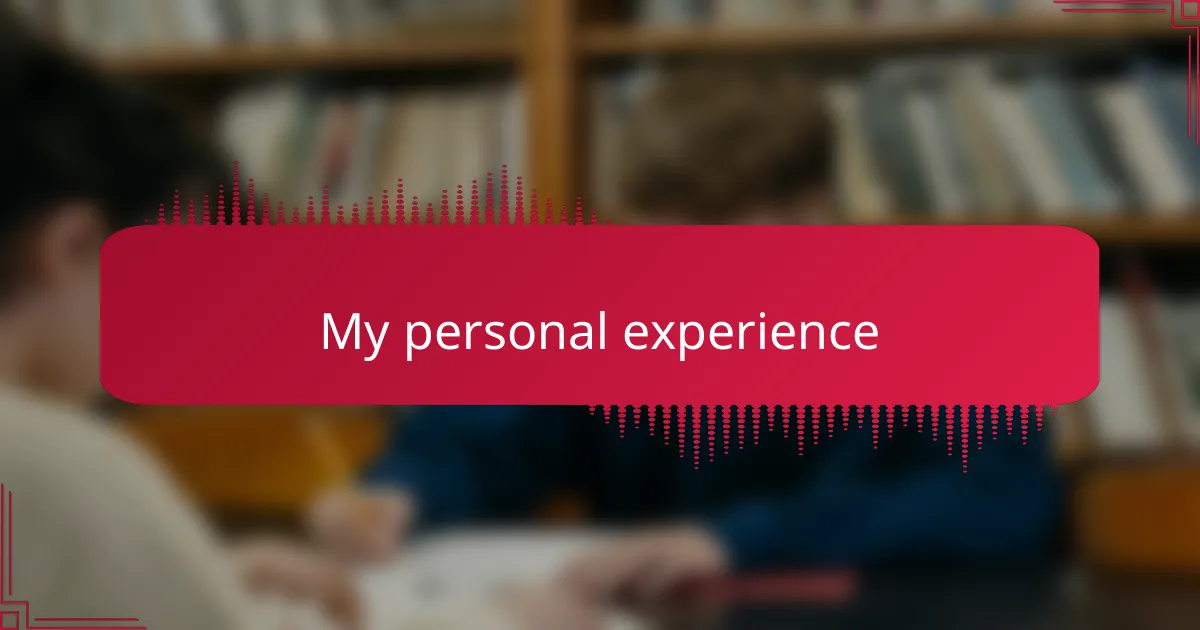
My personal experience
Attending writing retreats has been transformative for my creative growth. I remember my first retreat, surrounded by like-minded individuals, buzzing with inspiration and camaraderie. We shared our drafts and ideas during cozy late-night sessions, fueling each other’s creative fires. The accountability and feedback from my peers pushed me to explore new narrative styles and character arcs that I hadn’t considered before.
One of the most impactful experiences came when I workshopped a struggling character from my comic book. The insightful critiques I received opened my eyes to different perspectives and motivations I could explore. It was exhilarating to see my work evolve so quickly, driven by genuine collaboration. Here’s what I discovered about writing retreats:
- Access to constructive feedback from fellow writers
- A supportive environment that fosters creativity
- Opportunities to experiment with different genres and styles
- Lasting friendships with people who understand your journey
- The chance to immerse yourself in a distraction-free setting focused solely on writing
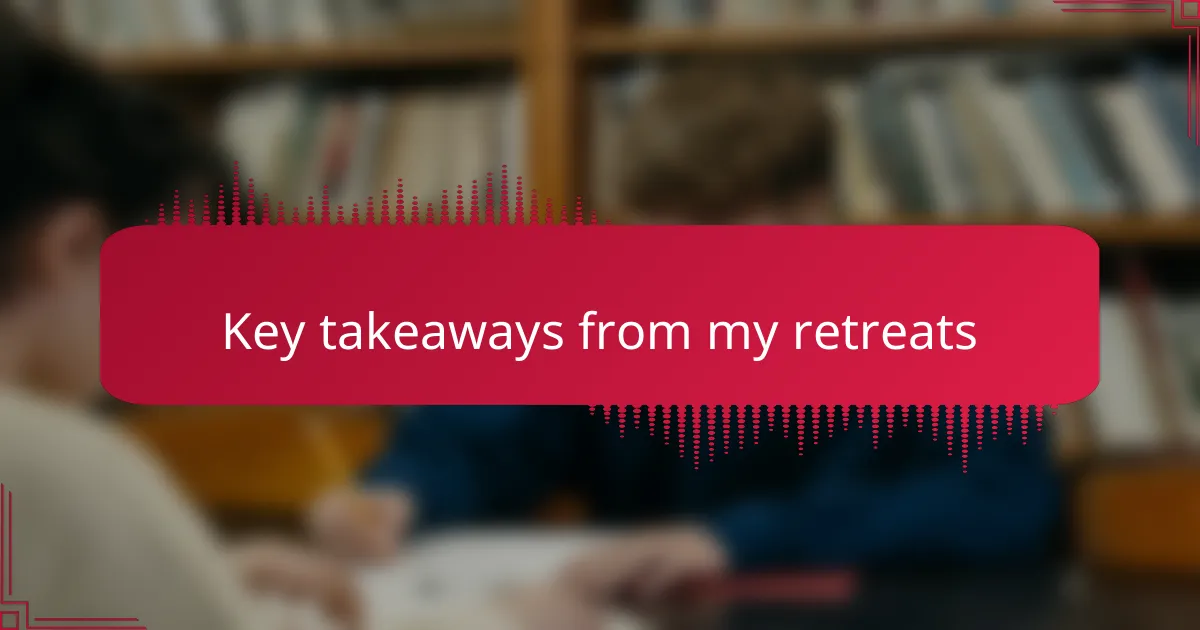
Key takeaways from my retreats
Key takeaways from my retreats
One of the biggest lessons I learned during my writing retreats is the power of connection. Sharing a space with fellow creatives fosters an environment where ideas can flourish and feedback becomes valuable. I recall a moment when a simple suggestion from a fellow writer helped me reframe a character’s motivation, leading to a breakthrough in my story.
Another valuable takeaway is the significance of dedicated time away from distractions. At one retreat, I found myself completely immersed in my work, free from the usual interruptions of daily life. This focus allowed me to dive deeper into my craft and explore new creative avenues that I had previously overlooked.
Lastly, the importance of self-reflection cannot be overstated. During quiet moments at these retreats, journaling became a tool for introspection, helping me clarify my goals and renew my passion for storytelling. It’s during these reflective times that I realized how much growth I’ve experienced as a writer.
| Key Takeaways | Personal Insights |
|---|---|
| Connection with Others | Fosters collaboration and new perspectives |
| Away from Distractions | Allows deeper focus and exploration |
| Self-Reflection | Clarifies goals and rekindles passion |
